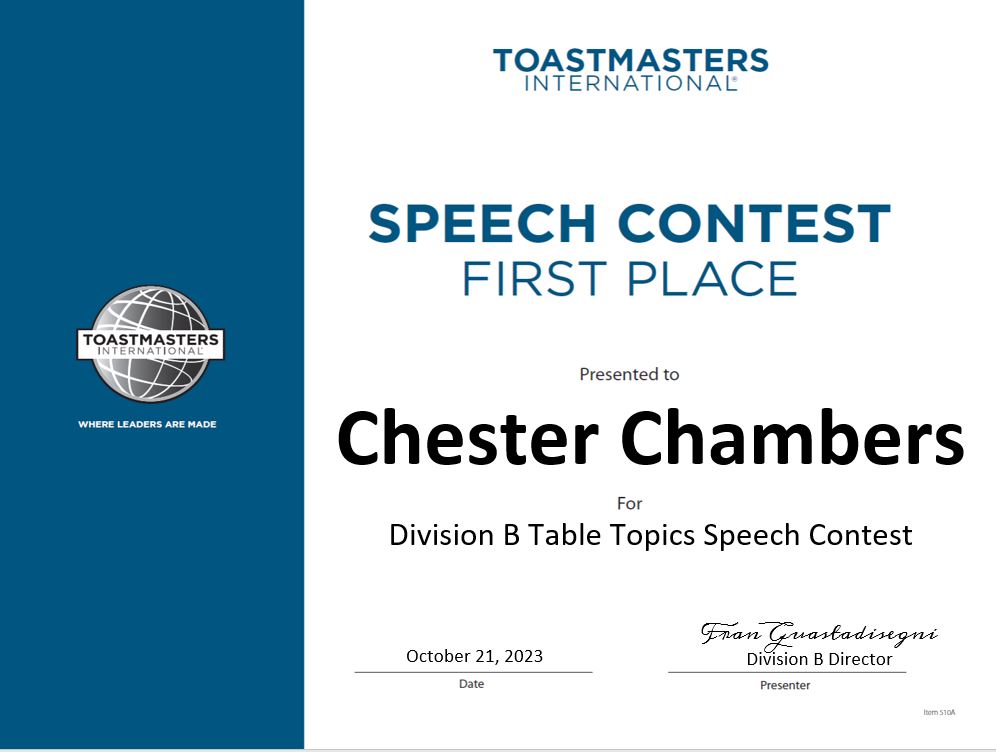If you have ever considered participating in a public speaking contest, let me tell you how this works and why you may want to give it a try. I am a member of Toastmasters International. Toastmasters is organized into small clubs that average around 20 members. Roughly 5 clubs form an area. Roughly 5 areas form a Division, and roughly 5 Divisions form a District. There are speech contests at each level set up in such a way that the quality increases as you move up the ladder.
Contest Types
Contests within Toastmasters fall into one of 4 categories; Table Topics, Evaluations, Humorous, and International. Table Topics is probably the simplest contest to understand and to get started in. In this context the speaker is given a short question or prompt and then given 1 to 2 minutes to respond. This is about as close to true extemporaneous speech as you can get. This type of contest is probably the easiest to prepare for, but the most nerve racking to participate in.
Evaluation contests are just what they sound like. A sample speech is given by a functionary. The contestants provide an evaluation of that speech and these evaluations are scored. Again, this is easy to prepare for because you will not know the topic of the original speech until you hear it for the contest, but it’s a bit less stressful, because you have more source material to work with. For many people its easier to react to content than it is to create completely new material on the fly.
The next category is the Humorous speech. I have no earthly idea how anyone does this. I have tried it and was about as funny as a root canal. However, this niche skill may has the most economic value. Everyone likes a funny person. She is more likely to make the sale, get the job, or create a lasting memory. I just have no capability in this domain so I will leave it at that.
The most famous contest within Toastmasters is known as the International Speech Contest. This is a 5 – 7 minute prepared speech on anything that you like. These involve the most preparation, as many speakers will tell you that they practiced their speech at least 100 times. The tradeoff is that when you finally deliver the speech, it’s a form of muscle memory.
What’s the Point?
With that background we can move onto the main question – why do it? Sometimes the best way to approach a hard question is to look at the opposite. Why not do it? That one’s easy – because its scary. Its not clear that the benefit will outweigh the cost and the cost is obvious. It’s a scary thing. However, I am going to submit to you that that is precisely the reason that you should do it.
We have all seen someone terrified to speak and forced to do it anyway. We have all heard voices cracking, volume falling, words muddled, and lines mixed up. We have probably seen balance fading, heads sweating, and in some cases perhaps even tears flowing. But I have yet to see any permanent damage done. I have also never seen one of these folks NOT get better the second time if they dared to try it again.
My advice to people considering this activity is always the same. Find something that scares you but can never kill you. Public speaking virtually always has both of those characteristics. You will feel fear, but no lion is going to maim you. No shark is going to bite you. No lightning is going to strike you. And there is another little known fact. It will scare you every time. Many people say the fear goes away – they are wrong. What happens is that the energy that the fear creates gets channeled in a more productive way. This is the magic of repeated public speaking.
But the larger point here is the main take-away. Find something that scares you and do it on purpose, with a plan, with intentionality, and with great preparation. Its still going to be scary, but the person who comes out the other side of that 5 – 7 minutes will be just a little bit better than the one that went in. Acknowledging, addressing, and managing fear is ALWAYS better than hiding from it in the hopes that it never becomes relevant. Working through a presentation is always a useful exercise if it can be done with no real risk of permanent injury.
That’s why a speech contest is a good idea, so why not give it a try?
